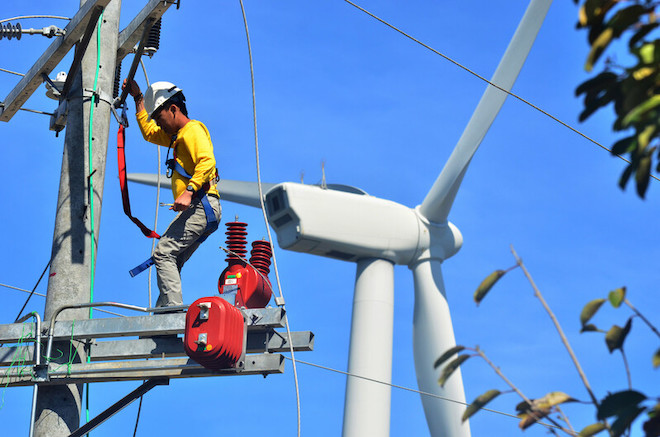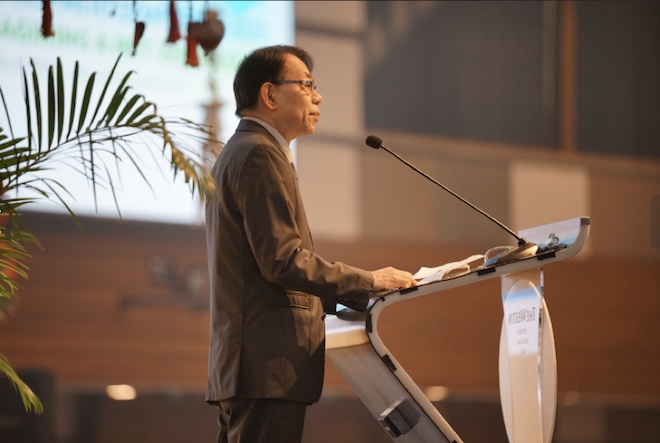
Countries need to urgently accelerate the adoption of solutions that can mitigate climate impacts and advance decarbonization, said experts at the recently concluded Southeast Asia Development Symposium (SEADS) organized by the Asian Development Bank (ADB).
At SEADS 2023: "Imagining a Net-Zero ASEAN", representatives from governments, businesses, and the development sector shared solutions that can meaningfully address the climate crisis.
SEADS 2023, held on 30 March at the Westin Resort Nusa Dua, Bali, Indonesia and simultaneously broadcast live, drew over 3,000 participants. The symposium was an official side-event of the ASEAN Finance Ministers and Central Bank Governors’ Meeting.

In his keynote address, ADB President Masatsugu Asakawa emphasized the need for countries to work together in building innovative solutions to decarbonize Southeast Asia while ensuring strong, sustainable, and inclusive economic growth. "Achieving a net-zero ASEAN will require a diverse range of partners all joining together to address climate change," he said. He noted that ASEAN countries had committed to reducing emissions and must now instill these climate goals in their policies, plans, and projects.
SEADS 2023 came at the heels of the latest Intergovernmental Panel on Climate Change (IPCC) synthesis report, which warned of the rise in global surface temperature to 1.1ºC above pre-industrial levels, causing widespread changes in the atmosphere and more intense climate hazards, particularly in Southeast Asia.
Regional and international cooperation
Other speakers at the symposium also highlighted the need for regional and international cooperation, while noting the world is not out of options despite the grim report from IPCC.
Indonesia Finance Minister Sri Mulyani Indrawati, in her keynote address, said Southeast Asian countries are working together to decarbonize while growing their economies. She noted that ASEAN, being the world’s fastest growing economic region, will require more energy to sustain growth, but this need not result in more carbon dioxide emissions. "We are committed to continue growing, but we're also strongly committed to achieve our net-zero ambition by 2060 or earlier," she said.
United Nations Deputy Secretary-General Amina J. Mohammed also called for collaboration and accelerated action. “We need international cooperation and support to also speed the decarbonization of high-emitting sectors. No one country alone will crack the nut to decarbonizing steel, cement, shipping, and aviation sectors.”
United Nations Environment Programme Asia and the Pacific Office Regional Director and Representative Dechen Tsering said ASEAN can strengthen collective action on net zero by sharing knowledge and experiences on best practices and emerging mechanisms such as carbon pricing and renewable energy trading.
Southeast Asia also needs to green global and regional value chains to advance its net-zero goals and to ensure continued economic growth, according to a new ADB report, ASEAN and Global Value Chains: Locking in Resilience and Sustainability, which was launched during SEADS 2023.
The report said the region could see net savings if it pushes its net-zero ambitions. According to the report, the cost of meeting the nationally determined contributions (NDCs) of each ASEAN member is estimated to be $50.1 billion, or 1.7% of the region’s gross domestic product, with value chain disruptions estimated to cost $166.9 billion. Comparatively, socioeconomic and biodiversity losses due to greenhouse emissions are estimated at $306 billion. If ASEAN economies deliver on their NDCs by 2030, they could see net savings of about $250 billion annually, said ADB Southeast Asia Department Director General Ramesh Subramaniam in a fireside chat with CNBC Indonesia News Anchor and Journalist Dina Gurning.
McKinsey & Co. Asia Sustainability Practice Partner and Leader Vaibhav Dua said Southeast Asia is looking at a $200-billion opportunity in the manufacture of solar photovoltaic panels, electric motorcycles, and batteries, as there is room to grow in both production capacity and demand not just in the region but the world given the push for all countries to decarbonize. “Manufacturing is not something that is new to us in the region. Manufacturing represents a core part of our GDP. It's a backbone that we have had for a long time,” he said in a presentation at SEADS 2023 on the potential of Southeast Asia for renewable energy manufacturing.
He cautioned, however, unlocking the region’s potential for these three opportunities would depend on whether the “right enablers”—regulatory policies, business ecosystems, technologies, and funding—are in place.
Advancing and financing new technologies
India G20 Sherpa Amitabh Kant said his country’s G20 presidency would build on some of the successes of Indonesia, its predecessor, which had placed transition toward a low-carbon economy on top of the G20 agenda.
Kant said India will push for innovative financing schemes as the transition to net zero hinges on the availability and alignment of low-cost international finance to advance critical new technologies. He said the transition to net-zero would require $200 trillion in investments in new and low-carbon infrastructure, technologies and solutions across sectors, such as heavy industries, transport, and health through 2050. He assured, “There is no shortage of finance.” He added, “The challenge before all of us is to de-risk projects and ensure that we are able to get long-term finance from private resources.”
Climate Bonds Initiative Chief Executive Officer Sean Kidney agreed finance is key to the transition. He noted that the green bond market has grown from $2 billion to $2.5 trillion over the years, indicating there is investor appetite for green investments.
US Department of Energy Deputy Secretary David Turk noted the need to deploy innovative clean solutions to bolster the fight against climate change. “We need to scale deployment-ready technologies at an accelerated clip. And, secondly, we need to fast-track next-generation solutions through the innovation pipeline."
He said the United States is doing its share in developing and commercializing clean energy technologies by putting in more than $21 billion for demonstration projects to advance nuclear, clean hydrogen, carbon capture, and other technologies to facilitate widespread deployment of these technologies in the fight against climate change. He said the government is partnering with the private sector to further accelerate these technologies for commercial liftoff. “Put together, these efforts will get next-generation solutions to the price point we need to speed deployment and decarbonization not just the United States but around our world.”
A high-level panel, meanwhile, examined innovative ways of sourcing capital for climate action and discussed how the financial sector could help speed decarbonization by mainstreaming climate action in every activity, clarifying green taxonomies, and ensuring that for every $1 of existing investment in the fossil fuel industry, $4 is invested in the green economy or the clean energy sector. The panel was moderated by Bloomberg TV APAC TV Anchor and Chief Markets Editor David Ingles and included Philippine Central Bank (BSP) Governor Felipe Medalla, Glasgow Financial Alliance for Net Zero Asia–Pacific Network Managing Director Yuki Yasui, Singapore Exchange Managing Director, Head of Sustainability and Sustainable Finance Herry Cho, and Mr. Subramaniam.
How Indonesia is responding
Indonesia is also accelerating its decarbonization. Minister Indrawati said the government has come out with a range of solutions, including offering fiscal incentives like tax holidays, tax allowance, and property tax to encourage investments in green projects. Indonesia is also working to introduce carbon pricing as well as carbon tax to internalize the cost of greenhouse gas emission under the polluter pay’s principle. Indonesia also issued green sukuk (Islamic debt securities) and SDG bonds, at both global level and domestic level to finance related projects.
Indonesia is also part of the ADB-backed Energy Transition Mechanism (ETM), which is being piloted to help countries retire coal power plants. Indonesia is already working on retiring the 660-megawatt Cirebon-1 power plant in West Java under the scheme. ETM is a scalable, collaborative initiative that will leverage a market-based approach to accelerate the transition of Asia and the Pacific countries from fossil fuels to clean energy.
Indonesia’s net-zero ambitions are also reflected in the plans for Nusantara, the new capital that will be built in East Kalimantan in Borneo, which is home to about 22 million hectares of rainforests.
Nusantara National Capital Authority Chairman Bambang Susantono said the government envisions the new capital to be the first Indonesian city to achieve net zero by 2045. He said the government is developing the new capital to be green, smart, inclusive, resilient, and sustainable.
He said creating a new capital city is not a standalone project but a critical component of Indonesia 2045. The plan envisions Indonesia becoming a high-income country on its centennial. “The development of a new city in the middle of Indonesia is expected to be the catalyst for greater economic distribution particularly in the eastern part of Indonesia and this in turn, will boost the country's economic and social growth.”
What companies are doing
Multinational companies are also doing their share in the race to net zero, with Google and Visa among the companies that have committed to decarbonize and launched programs to help governments and customers be more sustainable.
Google Vice-President for Government Affairs and Public Policy for Asia–Pacific Michaela Browning noted its philanthropic arm, Google.org, is supporting nonprofits in addressing sustainability challenges across the Asia and the Pacific. At last year’s SEADS, Google.org announced it was providing $3 million in seed funding for an initiative launched by social investor network AVPN with support from ADB to help nonprofits scale tech-enabled solutions that fight climate change.
In her keynote at SEADS 2023, Browning announced that 13 nonprofits would receive grants from the seed fund.
Visa's Chief Sustainability Officer Douglas Sabo said the company is helping consumers shift to a more conscious form of consumerism in support of the net-zero economy transition by tailoring its products and services to be more green. “We believe this is where our most important and impactful contributions to a net-zero economy will be,” he said as consumers around the world “want to do the right thing for the planet, for their families, and for themselves.”
In his address at SEADS 2023, ADB Southeast Asia Department Director General Winfried Wicklein said there is no time to lose on the race to net zero. “Climate change is the defining challenge of our lifetime,” he said. “Inaction, no longer, is an option.”

